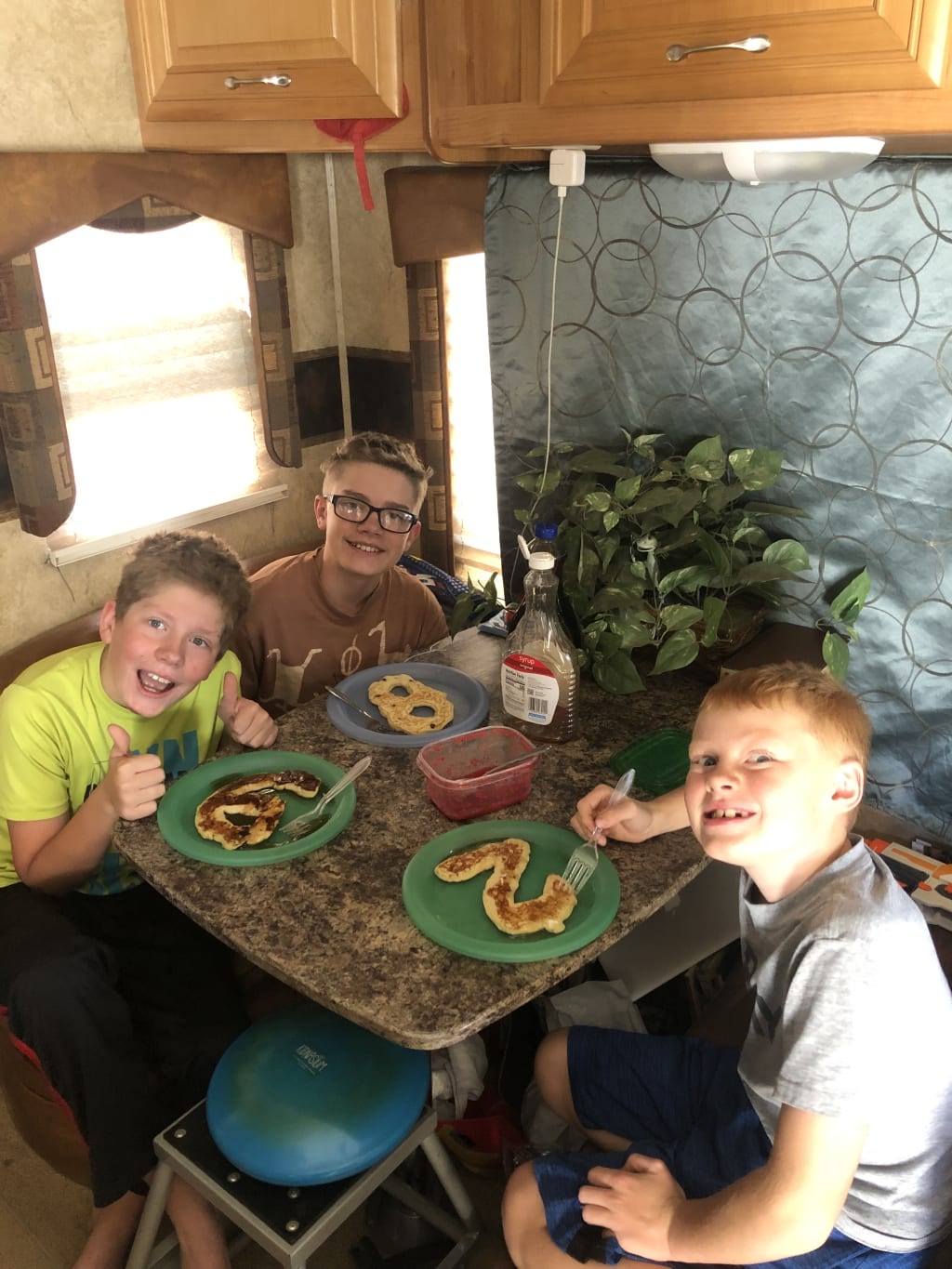Thinking of Homeschooling
Here are some answers to questions you may have.

If you are thinking about starting the journey of homeschooling you no doubt have a million questions running through your mind. I sure did when I started this journey.
Here are a few of the questions, in no particular order, I asked that you may be thinking about as well. Disclaimer, I am no expert by any means and this is all from my own experience and based on my opinion. Take what sounds good to you and build your own experience.
What style of homeschool should I do?
There are so many different styles out there, such as traditional, Charlotte Mason, Montessori, Waldorf, Classical, TJEd, unschooling, roadschooling, unit studies, online, eclectic, and I’m sure many others. First and foremost there is no wrong or right answer for which is “best”. You know your children and yourself and what is best and most important to you. Each family is unique and different (thank goodness), what works for one family may not work for the next. Research and pick an option that best fits your lifestyle and values.
What curriculum should I use?
There are thousands of different curriculums out there to pick from and it can be very overwhelming, especially when there are mixed reviews. I discovered this when I was frantically talking to every homeschool family I knew. One would praise a curriculum up and down and the next would proclaim how awful it was and to never touch it. I soon realized I just had to pick what I thought was best for us.
The style of homeschooling you decide on will narrow down the curriculums to pick from. You can also pick a curriculum based on your child’s learning style.
Not sure what your kids learning style is try some experiments and see which one they prefer. There are 4 main styles, visual (learn best by seeing/observations), auditory (learn best by hearing), read/write (learn best by reading and writing) and kinesthetic(learn best by doing/touching).
Once you have an idea of the type of learner your child is you can search for a curriculum that is best suited for them.
If you have more than one kiddo, like me, and they have different learning styles, like mine, you will have to make a decision. Do you have each kid use the same curriculum and just adjust it yourself to fit their learning style or do you get different curriculums for each kid? A few thoughts to consider, curriculum can be very expensive and much of it you can hang onto for the next kid to use. Next, having to work with multiple curriculums can be exhausting and time consuming. Figuring out ways to adjust curriculum to better fit a child’s learning style can take time and be exhausting as well. Personally, I use the same curriculum for each kid and just adjust the best I can for each child’s learning style. Some days I am better at this and other days I just stick with what the curriculum has laid out. I figure they won’t have people adjusting their teaching to suit their learning style in college or at jobs, so it can be good for them to learn how to learn with various styles.
Once you have decided on a curriculum go for it and see how it goes. If you all hate it you can always try something different. There are downfalls to switching curriculum though 1. as mentioned it can be expensive, 2. you may end up with gaps in learning. Different curriculums cover topics in different levels, so if you keep changing from year to year they may end up missing something along the way.
It is helpful to look through the curriculum if possible and see what you think of it before you make the purchase on it. Connect with homeschool groups and families in your area and ask them if you can look at their curriculum. If no one has what you are interested in try looking for YouTube reviews, while not as good as having it in hand it can help. You can also look on the websites that sale curriculum and they will often let you view several pages in the books to get an idea of how lessons work.
Once you pick something and start it, give it some time. This is especially true if your child has been in public school. There is going to be an adjustment and your child may not like it just because it’s not what he/she is used to. You may struggle greatly because the plans you had are not working as well as anticipated. There is a fair amount of what homeschoolers refer to as deschooling that will need to take place, not just for your child but for you as well. I don’t know how many times I heard the phrase, “That’s not how we did it in real school,” come out of my child’s mouth the first several months of starting school at home. I was often in tears as many of my ideas, plans, and carefully researched curriculum were met with indifference or out right hostility. Don’t give up, the first few months can be very difficult as you all adjust and work together to find what works and what doesn’t for your family. The general rule of thumb for how long deschooling will take is one month for every year of traditional learning.
How do I actually homeschool?
One thing to keep in mind is that each state is different on requirements to homeschool. So, you will need to do some research and find out what your state will require. Most states will want a letter turned in stating your intent to homeschool. Most will require certain subjects be taught and that samples of your child’s work be turned in at various times. Once you know the requirements for your area be sure to keep an updated binder of everything they want to see.
After getting the state requirements down you can work on your own. It’s not a bad idea to start off each school year figuring out what goals you’d like each child and yourself to reach and also what goals the child would like to accomplish. Of course there will be the basic school subjects to learn and do, but what other interests do you each have and would like to pursue? Figure out a way to work those interests in and set goals for them as well. This may be as simple as getting books from the library to study the topic, watching documentaries or YouTube channels about it, practicing it on your own, on up to finding people/businesses in your community to help teach/instruct on it.
With the curriculum and planned out goals for other interests in front of you map out your school year. In general the school year lasts 36 weeks, some places it’s a few weeks longer or shorter. The beauty of homeschool is you can do it whenever and however works best for your family, if you want to spread it out the whole year go for it, if you want to push it all out in 18 weeks go for it(I’d wait until you have a good system down before attempting this though).
The easiest way, in my opinion, to plan out the year is to start with the curriculum and divide the number of lessons in it by the number of weeks you want to do school. Now you know how many lessons your child needs to complete each week to finish everything. Don’t forget to take into account tests and reviews if a subject has those separated from the lessons. Once you have the curriculum mapped out, you can then add in the determined steps and timing to accomplish each goal/s you all have.
For some just knowing I have to do X lessons in each subject each week might be just fine. I need things a bit more organized so I worked up an excel spread sheet. I have one page with all my kids on it for each week of the school year that I fill out before school starts. It tells me the basic info each kid needs to accomplish that week. I have another sheet that has each subject and each day of the week. At the beginning of each week I print a sheet for each kid and fill it out with more specifics. Which lesson or pages from a lesson each kid will do each day. That way the kids can hold onto it and know what they need to do. It also allows me to change things up when needed. If we have something we need to go do on one day that will take all day I can have that day be one with less school work.
How do I teach each kid/s?
If you have more than one child this can be a major concern. In general you’ll have the lessons you can all work on together. Typically history and science are subjects you can do in a group setting. Every one will hear the same lesson, but each child will have different expectations for what to do for assignments. Younger kids may just draw a picture or answer multiple choice questions while older kids might do a bigger project or write an essay/research paper.
I prefer to do group time first then we have a “recess.” I had to actually start calling it recess because this was one thing the kids flipped out over, that they didn’t get a recess anymore. I had let them have a break after group time from day one, but I never actually said this is recess time, so for some reason despite the fact that they were playing and having fun it was still school time in their minds. Oh how my eyes rolled when I would call them to do more school, and they cried out about the unfairness of not getting a recess.
After recess we start on individual work, language arts and math. As the kids get older they are able to do more of this on their own without my help. My oldest now knows what he needs to do and he reads the lesson and does the work on his own, asking for help if he doesn’t understand something. He has even been known to search the Internet for help understand something because he doesn’t want to wait for me to finish teaching his brother so I can help him. When they were younger and I needed to do more instructing we would take turns. While I was working with one child the other two would work on things they could do without my help, such as reading a book coloring a picture, building something out of legos or play-Doh that had to do with one of our group lessons. I would rotate through each kid doing the instruction part and getting them set up to do the worksheet or assignment after the instruction. If one kid finished their worksheet while I was helping another they could join in doing some of the activities, like the ones stated above, I allow during school time. We continue to rotate doing one subject at a time with each kid until they all have had their lesson done and are working on completing assignments. The older kids will often help out the younger ones too, which works great because when you teach you understand more.
What if I mess something up and they don’t learn everything they should?
In all honesty you are going to mess something up and there will be things they don’t learn. But, don’t stress, that is going to happen wherever they do school.
Public teachers are not perfect, they make mistakes, they skip over topics, they struggle to teach some days, so give yourself some grace. You won’t do it right all the time probably not even most of the time and that is ok. Chances are you won’t get through the entire curriculum especially the first year you start homeschooling. You will have a lot to learn about each other and what methods and schedules work best for you all. Getting down a good system and good base is going to need to take priority over making sure every lesson gets completed. Even in public schools they don’t always complete every lesson in each subject. That is why you so often see a review of last years lessons at the beginning of the new years curriculum.
Here is what a good friend told me that helped ease my fears a bit about screwing things up. She told me,at least at the end of the day your kid knows he/she is loved dearly and you are doing the best to your knowledge to help them, that is what is most important. They won’t get that in a school building, a public teacher will not sit on their bed at the end of the day telling them how much they are loved and apologizing when it’s been a crappy teaching day.
What if I don’t understand a subject well enough to teach it?
Thankfully curriculums will have all the instruction and you won’t have to come up with it. Just go over the lesson with your kid and see how they do with it. Also, thankfully, most curriculums come with a teachers or solutions manual that gives you the answers. So, even if you don’t understand it yourself you at least have the answers to know if your child gets it.
A little hint, even if you understand a subject well buy the solution manual and save yourself time on grading work. You’ll be busy enough doing everything you won’t want to solve each problem yourself to make sure your kid got it correct.
One thing I have discovered, as I teach my kids, is things that didn’t make sense to me trying to learn, as a kid, I now get.
What if I don’t know the answer to questions they have about schoolwork?
Don’t be worried about not knowing how to do problems or knowing answers to questions. You don’t have to know it all and when your kid comes to you with a question you don’t know how to solve it’s a golden opportunity to say “I am not sure, but let’s figure it out together.” Those are amazing moments to teach them how to learn and helps the kids realize that it’s ok to not know it all. We are all unique and all have different abilities, there is no way we are going to have all the answers all the time. It’s important for them to learn how to problem solve and work out a solution, especially for those things that don’t come naturally.
What if we don’t stick to my schedule or complete all the lessons in the curriculum?
As mentioned above chances are you will not finish everything the first year you start or other years when crazy life events happen. The first year is going to be more about getting in a routine that works for your family. It might be a good idea to let kids know before you start the school year that it’s basically a trial run and things might not go as planned and scheduled, so be prepared for some improvising. If you want let them be part of decision making, because you’ll have to make a decision at the end of the year depending on how far along you get in each curriculum. You can either keep going past the time you intended to stop in order to finish out the lessons, take a short break and come back to finish, wait and finish them at the start of the next year, or just don’t worry about completing them at all. You’ll have to make the decision on what is best based on how many lessons you have remaining and if those lessons will be reviewed at the beginning of next year’s curriculum or not.
What if my child is just not understanding a lesson?
One of the beauties of homeschooling is you will know when something is not making sense to them and you can take the time to make sure it does. Your goal is to make sure the kids understand the lessons not that they finish them, so if it takes several days to get to the point of understanding don’t get stressed. I still struggle with this myself because my mind still sees pages marked off as progress. I am continually reminding myself that checking the lesson off is not the progress, understanding the concept is even if it takes weeks for the kid to get it. This can get extremely frustrating trying to find what way of explaining or showing will click and bring understanding when they do struggle on a concept, and at times (if it’s not pertinent to know for moving to the next lesson) we have just moved on and come back to it later. We have also tried having Google, family, or friends do the explaining in hopes their method will be the one that clicks. This is probably one of my most frustrating parts of homeschooling is when I can’t figure out how to explain a concept in a manner that helps them. If this happens to you, don’t forget to explain to your kids that you are frustrated with the situation not them. My poor kiddos at first would get so down on themselves and it finally clicked with me that they thought I was mad at/ disappointed in them for not understanding. I had to, and still have to at times, let them know my brain is different from theirs and we are each different from every one else so sometimes it’s hard to find a way to explain things in a manner their brain gets. It is also important to let them know that they are not in any way stupid for not getting it right away. I often have to remind my kids that everyone learns different and everyone has different talents, so while they might struggle to get this or that concept they excel in other areas. Everyone is unique and different which is why sometimes things that make perfect sense to one person can be difficult for another to understand, but that doesn’t mean they are less of a person. The world would be a pretty boring place if we all thought and acted exactly the same.
What if my spouse is not ok with homeschooling?
I highly recommend you help solve your spouses concerns before starting on this journey. You are going to be worn out, mentally, physically, and emotionally so it is going to be important that you have support. If your spouse is already against doing homeschool he/she is not going to be as understanding when you come to them at the end of a really exhausting day. You’ll want to fall into their arms and hear something like “It’s ok, you can do this,” not “Well, I told you this was a bad idea.”
You’ll need to be a team for sure, homeschooling is not just one parent does it. You’ll need to work together helping teach and figuring out how to solve difficulties as they arise.
What about missing out on my own time?
You are certainly going to be feeling this lack of time and personal space especially if your kids were going to other schools. You are going to need to be sure and fill your own cup. If you don’t take time for yourself you are all going to be struggling big time. As mentioned above it is going to take a lot out of you, especially in the beginning. Whatever it is you need to recharge make sure you add it into your schedule. Don’t let it get pushed aside because, trust me, you will all be hating life.
This goes for each kid as well, everyone will need to have time to do whatever it is that helps them recharge. If it’s having some alone time or getting away with friends make sure you schedule that in. It’s also going to be important that you set some boundaries and make sure everyone knows what they are for yourself and each other.
What about my child with a disability that makes learning difficult?
One of the biggest lessons I had to learn is that teaching my kid how to learn, despite the challenge he was given, has to come first. And, it’s a continuous process. Seek out help in anyway you can find for how best to help them learn. Read books, find groups, listen to podcasts, ask professionals. Try out the methods you discover and don’t give up. It’s been years of working with my son with adhd and he is finally starting to recognize for himself when he is not paying attention and can redirect himself back to work. He is able to tell me, “I’m sorry mom can you say that again, I lost focus and didn’t hear you.” Or, “This fidget toy is not helping me focus I need to try something else.” It’s not every time, but it’s an improvement for sure.
I spent so much time, energy, and tears trying to force him to learn before realizing he just needs tools to help him know how to learn. Find the tools your kid needs and be kind with each other as you both learn how to use them.
What else should I know?
Just try and be patient with your kids and yourself. There will be days you’ll all be crying and cursing each other by the end of it. There will be the glorious days in between where you see the light bulb turn on in your kids brain, or you see the excitement in learning something new and those are the days that keep you going. There is a lot of freedom that comes from homeschooling and it’s amazing to be able to change your schedule when you want and go do things that give your children life experiences they will never forget.
There is always the good, the bad, and the ugly just learn to embrace each moment and learn from it!
If you’d like to read my thoughts on the curriculum we have used check this link out.
If you’d like to learn about homeschooling while traveling check this one out.
If you’d like to hear our start into homeschooling check out this story.






Comments
There are no comments for this story
Be the first to respond and start the conversation.